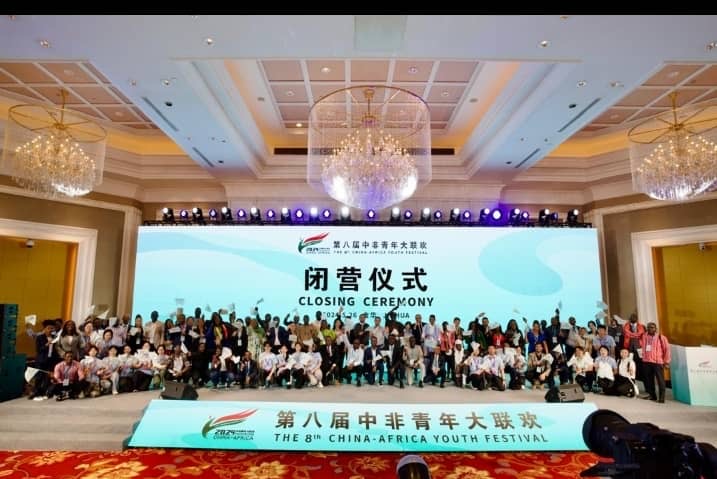By Elijah Nduhukire;
Joseph Brighton Malekela, chief operations officer of the Africa-Asia Youth Foundation, at the closing ceremony in Jinhua city in Zhejiang province, revealed that from the ancient maritime trade routes that connected the two regions to the more recent era of decolonization and liberation struggles, our destinies have been intertwined.
“It is with great honor and privilege that I stand before you today to speak on the topic of ‘To be the successor of China-Africa traditional friendship.’ This is a subject of immense significance, as it embodies the deep-rooted ties that have long existed between China and the nations of Africa. It further provides an intensive thinking on best practices that can strengthen this noble cooperation beyond generations. Let us embark on a journey through history, tracing the origins and evolution of this enduring friendship,” he said.
Malekela added that during the turbulent times of colonialism and imperialism, China stood in solidarity with African nations in their quest for freedom and self-determination.
“We supported each other in the face of oppression and exploitation, forging bonds of friendship that have stood the test of time. On the same note, my beautiful country of the United Republic of Tanzania played a significant role in supporting China’s admission to the United Nations in 1971. Tanzania’s then-president, Julius Nyerere, was instrumental in advocating for China’s rightful place in the international community, despite opposition from other quarters. It is the principles of equality, mutual respect, and non-interference in internal affairs that formed the cornerstone of our China-Africa relationship,” he noted.
In the post-colonial era, China continued to support Africa’s development efforts through various forms of assistance and cooperation. From infrastructure projects to educational exchanges, our partnership has yielded tangible benefits for both sides. Chinese investments have helped to build roads, bridges, schools, and hospitals across the African continent, contributing to economic growth and human development.
China-Africa relations have reached new heights, characterized by extensive trade and investment, political dialogue, and cultural exchanges. China has become Africa’s largest trading partner, with bilateral trade reaching unprecedented levels in recent years, recording over $208 billion in trade by 2023. Chinese companies are involved in a wide range of sectors, from manufacturing and construction to telecommunications and agriculture, driving economic growth and creating jobs in Africa. According to the China Global Investment Tracker, between 2005 and 2020, Chinese firms invested over $300 billion in various sectors across Africa.
Malekela also quoted H.E. Xi Jinping, President of the People’s Republic of China, who said, “China and Africa are good friends, good brothers, and good partners. No one could undermine or weaken this great friendship and cooperation between the Chinese and African people.”
But amidst the successes, challenges remain. Pressing concerns now are on debt sustainability, transparency and accountability, labor practices, social responsibilities, and environmental protection.
“It is imperative that we address these challenges, which requires a concerted effort from both China and Africa, as well as open dialogue, cooperation, and a commitment to shared goals and values. By tackling these challenges head-on, the traditional friendship between China and Africa can continue to thrive and contribute to the development and prosperity of both parties,” Joseph stressed.
Nevertheless, the opportunities for further collaboration between China and Africa are vast. In the fields of technology, innovation, and entrepreneurship, there is much potential for mutual learning and exchange. China’s experience in rapid industrialization and economic development can serve as a valuable source of inspiration for African nations as they seek to chart their own path to prosperity.
Joseph Malekela called upon the incumbent and future successors of the China-Africa traditional friendship to uphold the principles of equality, mutual respect, and win-win cooperation that have defined our relationship for centuries. On the same note, several actions and strategies can be pursued, including enhancing economic cooperation; supporting infrastructure development; promoting people-to-people exchanges; addressing common challenges together; fostering political dialogue and diplomatic cooperation; and, more importantly, promoting people-centered development.
Nelson Mandela, former president of South Africa, once said, “The people of China and Africa share a common vision for the future based on equality, mutual respect, and solidarity. Together, we can overcome any challenge and build a better world for all.”
This statement was also supported by Mwalimu Julius Nyerere, founding father of Tanzania, who said, “The friendship between China and Africa is built on a solid foundation of mutual respect, solidarity, and shared aspirations for development. It is a partnership based not on exploitation, but on cooperation and mutual benefit. Together, we can overcome any challenge and build a better future for all our peoples.”
Malekela concluded by sharing the initiatives of his organization, the Africa-Asia Youth Foundation (AAYFO), headquartered in Tanzania. The foundation is promoting collaboration between the youth of Africa and Asia (including China) in areas such as education for sustainable development, cultural exchange, social entrepreneurship, and innovation in ICT. He expressed gratitude to the Chinese Embassy in Tanzania for its reliable support.
He urged all the young people of Africa and China to reaffirm their commitment to strengthening this longstanding friendship between China and Africa for our generation and future generations. “Let us seize the opportunities that lie ahead and overcome the challenges that may arise, guided by the spirit of solidarity and cooperation that has always characterized our partnership. Together, we can build a brighter future for all our peoples and contribute to a more just, peaceful, and prosperous world,” he advised.























